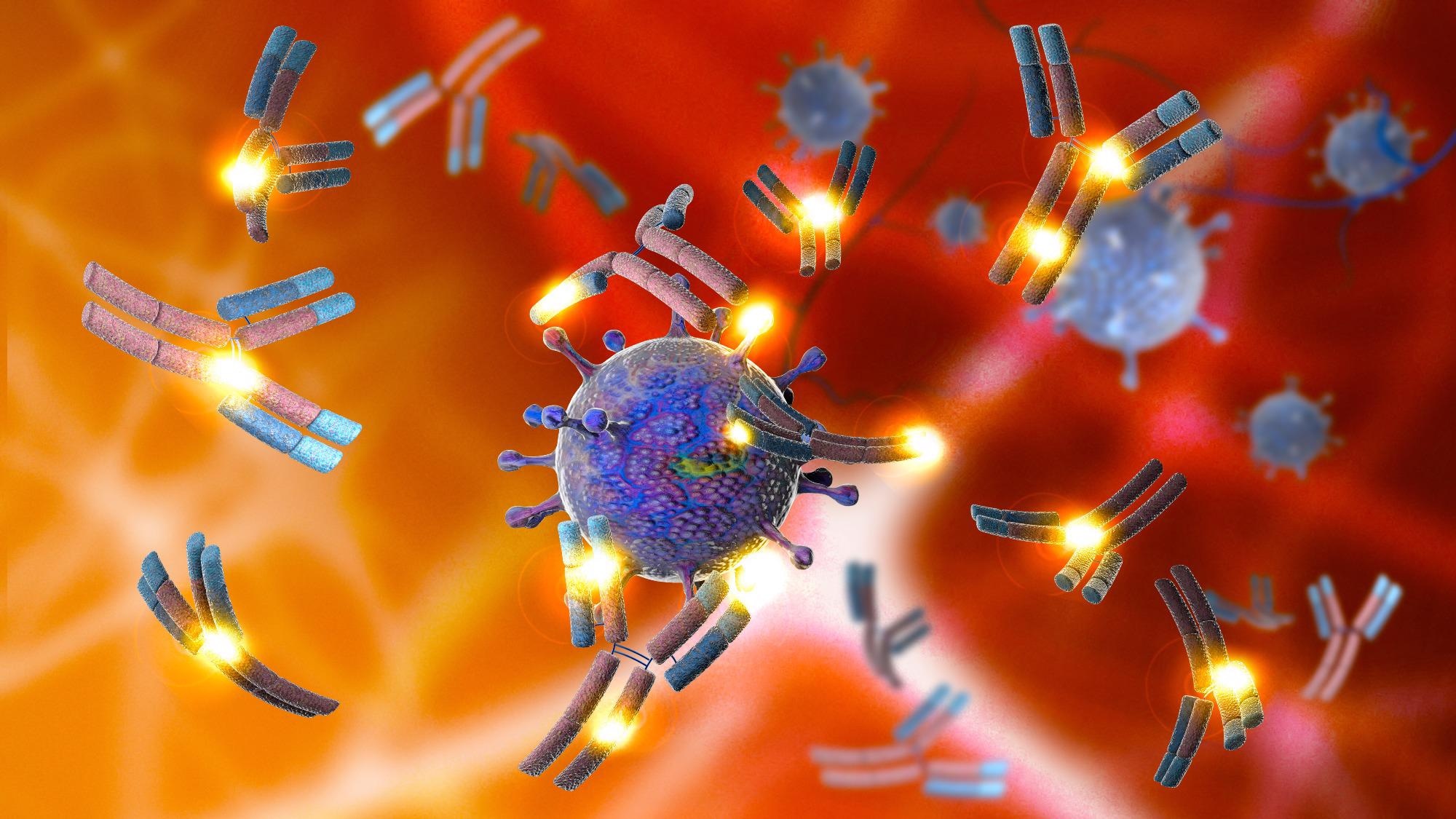Monoclonal-antibody combination AZD7442 prevents COVID-19
In a recent study published in The New England Journal of Medicine, the researchers examined the monoclonal-antibody combination AZD7442 to prevent coronavirus disease 2019 (COVID-19).
Severe acute respiratory syndrome coronavirus 2 (SARS-CoV-2) vaccines have curbed the transmission of the virus to a great extent. However, individuals who cannot be vaccinated, like immunocompromised persons, continue to be at risk of severe COVID-19 infection.
 Study: Intramuscular AZD7442 (Tixagevimab–Cilgavimab) for Prevention of Covid-19. Image Credit: Naeblys / Shutterstock
Study: Intramuscular AZD7442 (Tixagevimab–Cilgavimab) for Prevention of Covid-19. Image Credit: Naeblys / Shutterstock
About the study
In the present study, the researchers reported the phase 3 PROVENT trial results that evaluated the efficiency of AZD7442 in preventing symptomatic and severe SARS-CoV-2 infection in adults. AZD7442 combines two long-acting antibodies (LAABs), tixagevimab and cilgavimab.
This ongoing, double-blind, multicenter trial assessed the safety and effectiveness of a dose of AZD7442, which consisted of one tixagevimab and one cilgavimab intramuscular injection, administered consecutively. The trial examined the drug for preexposure prophylaxis against SARS-CoV-2 in high-risk adults who either had an inadequate response to the SARS-CoV-2 vaccine or were at a higher risk of COVID-19 exposure.
The participants eligible for the study were adults aged 18 years or above and had a higher risk of an inadequate response to the SARS-CoV-2 vaccine or exposure to contracting COVID-19. The eligible participants were also required to test SARS-CoV-2 negative at the point-of-care SARS-CoV-2 serological analysis during screening. Importantly, the team excluded participants with a history of COVID-19 infection, SARS-CoV-2 positivity during screening, history of vaccination, or an allergy to a component in the placebo or AZD7442 formulation.
The trial had a screening period of seven days, a safety and efficacy assessment period of 366 days, and an additional assessment period of 91 days after the 366-day assessment. The participants were assigned in groups of 2:1 ratio. Each group received either a single dose of AZD7442 or a saline placebo on day 1 of the study period. The participants were subsequently monitored for any adverse effects (AEs) for one to four hours post the injection and once a week after that for any COVID-19 symptoms.
The primary endpoint for safety was the occurrence of AEs after the injection of AZD7442 as compared to the administration of the placebo. Furthermore, the primary endpoint for efficacy was the first incidence of a COVID-19 symptom, confirmed via a reverse transcriptase-polymerase chain reaction (RT-PCR) test, after administering AZD7442 or the placebo and on or prior to day 183. Moreover, participants were reported to have a primary endpoint event if they had any symptoms that indicated a COVID-19 infection and tested RT-PCR positive for COVID-19 five days before or 10 days after symptom onset.
Results
A total of 5,973 participants were screened for the trial between 21 November 2021 and 22 March 2021. Among these, 3,460 randomly received AZD7442, while 1,737 received the placebo. The median time from administering the placebo or the AZD7442 to the primary analysis was 83 days. Furthermore, the mean age of the study cohorts was 53.5 years, among which 43.4% were aged 60 years and above, and 46.1% of the participants were female. During the time of screening, almost 74% of the participants were considered to be at a higher risk of infection due to inadequate COVID-19 vaccination, 52.5% were more exposed to SARS-CoV-2 infection, and 77.5% had comorbidities.
The team conducted the primary analysis after 30% of the eligible participants chose to know their randomized assignment. The primary safety analysis was performed on 3,461 AZD7442-administered and 1,736 placebo-administered participants. On the other hand, the primary efficacy analysis was conducted on 3,441 AZD7442-treated and 1,731 placebo-treated participants. Moreover, a total of 0.5% of the total participants tested SARS-CoV-2 positive during the screening and were excluded from the study.
The primary analysis showed that at least one AE was reported by 35.3% of the participants treated with AZD7442 and 34.2% of the placebo-treated group. A majority of the AEs reported were mild to moderate. Almost 2.4% of the AZD7442-treated participants had an injection-site reaction, while the same was reported by 2.1% of the placebo group.
The team reported the deaths of eight individuals belonging to the placebo cohort; these deaths were confirmed to be related to COVID-19. Two deaths each in the AZD7442 and the placebo groups were due to illicit-drug overdose, while two deaths due to myocardial infarction and renal failure were observed in the AZD7442 group.
Only 0.2% of the AZD7442-treated and 1.0% of the placebo-treated participants displayed a symptomatic COVID-19 positive illness. This indicated a substantially lower occurrence of symptomatic COVID-19 in the AZD7442 group as compared to the placebo group. Moreover, severe COVID-19 was observed in none of the AZD7442-treated and one of the placebo-treated participants.
Overall, the study findings showed that the clinical usage of a single dose of AZD7442 could effectively prevent symptomatic and severe COVID-19 infections.
- Intramuscular AZD7442 (Tixagevimab–Cilgavimab) for Prevention of Covid-19, Levin, Myron J.; Ustianowski, Andrew; De Wit, Stéphane; Launay, Odile; Avila, Miles; Templeton, Alison; Yuan, Yuan; Seegobin, Seth; Ellery, Adam; Levinson, Dennis J.; Ambery, Philip; Arends, Rosalinda H.; Beavon, Rohini; Dey, Kanika; Garbes, Pedro; Kelly, Elizabeth J.; Koh, Gavin C.K.W.; Near, Karen A.; Padilla, Kelly W.; Psachoulia, Konstantina; Sharbaugh, Audrey; Streicher, Katie; Pangalos, Menelas N.; Esser, Mark T, 2022/04/20, New England Journal of Medicine, DOI: https://doi.org/10.1056/NEJMoa2116620, https://www.nejm.org/doi/full/10.1056/NEJMoa2116620
Posted in: Drug Trial News | Medical Research News | Disease/Infection News | Pharmaceutical News
Tags: Allergy, Antibodies, Antibody, Coronavirus, Coronavirus Disease COVID-19, Efficacy, Medicine, Myocardial Infarction, Overdose, Placebo, Polymerase, Polymerase Chain Reaction, Prophylaxis, Renal Failure, Respiratory, Reverse Transcriptase, SARS, SARS-CoV-2, Severe Acute Respiratory, Severe Acute Respiratory Syndrome, Syndrome, Vaccine, Virus

Written by
Bhavana Kunkalikar
Bhavana Kunkalikar is a medical writer based in Goa, India. Her academic background is in Pharmaceutical sciences and she holds a Bachelor's degree in Pharmacy. Her educational background allowed her to foster an interest in anatomical and physiological sciences. Her college project work based on ‘The manifestations and causes of sickle cell anemia’ formed the stepping stone to a life-long fascination with human pathophysiology.
Source: Read Full Article
